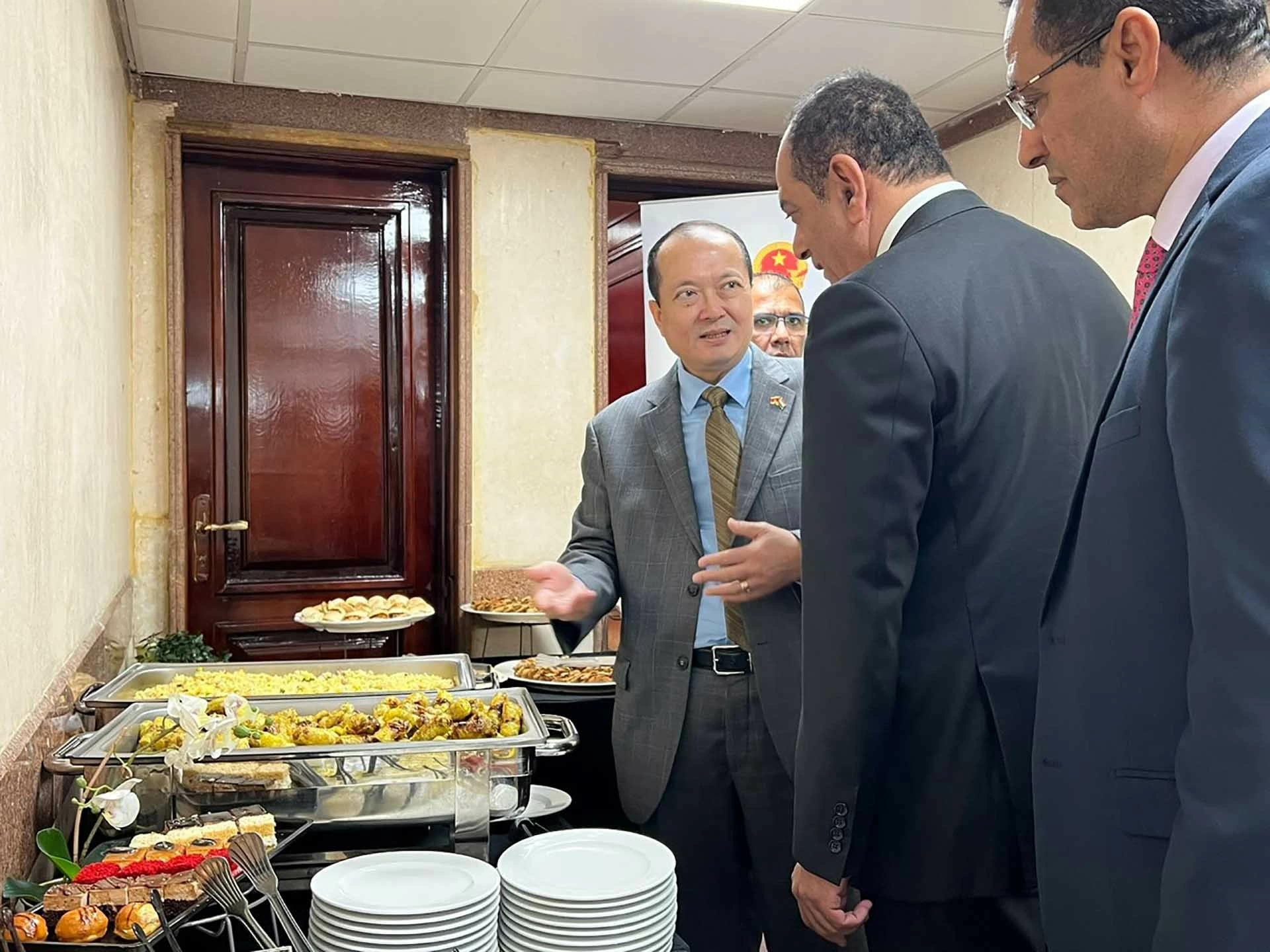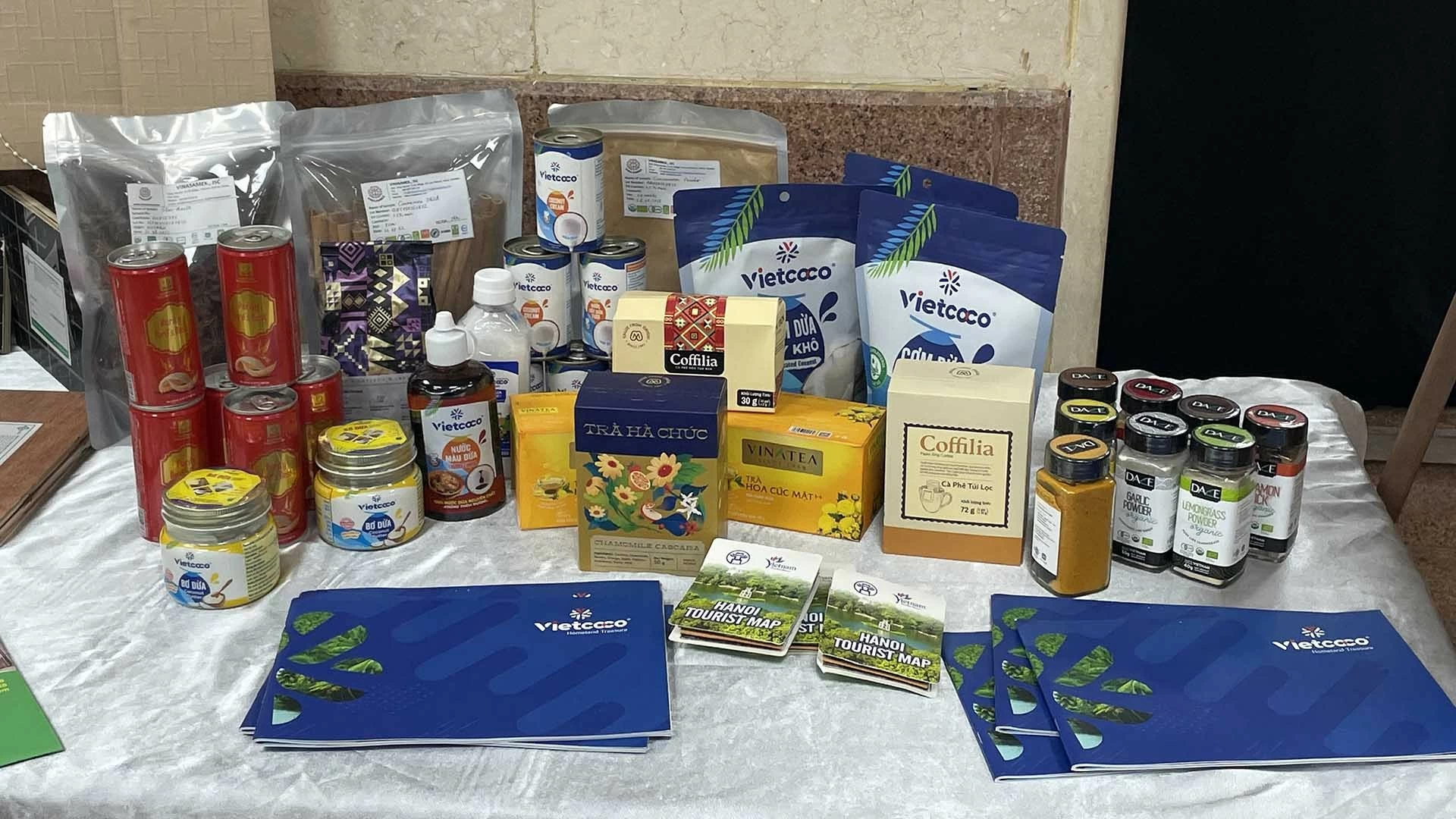
Halal market: To grasp ‘precisely and focally’
Latest
 |
| Ambassador Nguyen Huy Dung promotes Vietnamese cuisine prepared and processed in accordance with Halal standards to Egyptian friends. (Source: Vietnamese Embassy in Egypt) |
What are the potential and outstanding features of the Halal market in Egypt, Ambassador?
Egypt is one of the most populous Muslim countries in the world, with over 106 million people (by June 2024), of which about 90% are Muslims. Egyptian food market revenue is expected to reach 165.10 billion USD in 2024. During the period 2024-2029, the market is expected to grow at an annual rate of 9.74%.
Halal standards put forth a set of rules for the selection of ingredients and processing procedures. Therefore, only products or foods produced according to Halal standards are easily accepted by Muslim consumers.
For non-Muslim consumers, Halal products represent hygiene, quality and safety when produced strictly according to a specific standard system. These products are increasingly popular and have become a new consumer trend in many developed countries.
Egyptian consumers are well aware of the quality and variety of imported products, so their shopping habits are changing significantly. Previously, they mostly bought food from small shops in the neighborhood.
With the increase in the number of supermarkets and shopping malls in cities, providing all services at one place, many middle to high income earners have started shopping in supermarkets. Fast food chains, local restaurants and resorts have started favoring imported goods.
Egyptian consumers are looking for a wide range of Halal-certified products. In addition to functional foods, pharmaceuticals, or cosmetics, they are also more interested in new and different Halal products on the market. The demand for Halal products is therefore increasingly high, which is a difficult problem but also an opportunity for manufacturers and exporters.
What plans and activities does the Vietnamese Embassy in Egypt implement to support Vietnamese businesses in exploring the local Halal market, and at the same time promote the Vietnamese market to Egyptian businesses?
In recent times, Vietnam has mainly exported to the Egyptian market products that do not apply Halal standards such as seafood, cashew nuts, coffee, pepper and some non-food products.
Egypt's Halal market is still quite new to Vietnamese businesses and has not received much attention. Therefore, the Embassy has built the Egyptian Halal Market Profile to inform Vietnamese businesses about some market characteristics, regulations, Halal certification procedures and relevant Egyptian authorities’ addresses.
Recently, I met Mr. Mazen Wafa, Director of the Egyptian Halal Certification Organization – ISEG Halal to discuss cooperation options. This is the only organization authorized by the Egyptian government to issue Halal certificates for products imported into Egypt.
The Embassy always pays attention to promoting the Vietnamese market with Egyptian businesses through visits and working sessions of Vietnamese delegations to Egypt and newsletters sent to Egyptian partners.
We built a product display corner so that Egyptian businesses can directly check the quality of Vietnamese products.
In addition, in foreign affairs activities and public events, the Embassy always promotes Vietnamese cuisine such as spring rolls, pho and other dishes that are properly prepared and processed, showing the image of a friendly Vietnam, ready to meet Halal standards.
Vietnamese businesses are gradually becoming more aware of Halal standards, not only in the food sector but also expanding to many other sectors, including tourism, to serve the needs of the above potential customer group.
 |
| A product display corner at the Embassy so that Egyptian businesses can directly check the quality of Vietnamese products. (Source: Vietnamese Embassy in Egypt) |
What is your advice to Vietnamese businesses who are interested in and want to cooperate with Egyptian partners in the Halal industry?
Although the Egyptian Halal industry is new to Vietnamese businesses, this market has a lot of room for exploitation and is worth exploring and cooperating with.
First, businesses need to equip themselves with knowledge about Halal standards and regulations and procedures for granting Halal certification in Egypt in particular and Muslim countries in general. Once they have a clear understanding of these standards, businesses need to make initial investments to build appropriate infrastructure or human resources.
Companies and enterprises need to proactively propose their needs and desires to diplomatic missions abroad so that these agencies can grasp the needs of enterprises, as well as propose precise and focal assistance measures.
Among the Halal food products that are in great demand in the Egyptian market are livestock meat (beef, lamb, etc.), dried nuts and dried fruits, especially during major holidays such as Ramadan, Eid Al-Fitr (around March-April every year) or Eid Al-Adha (around June every year). Notably, Egypt currently only applies quality control and Halal standards to products made from livestock and poultry but has not yet applied them to seafood products.
Besides food, tourism that meets Halal standards and Islamic requirements is also a potential field. The middle and upper class of Egyptians have a great demand for travel and are willing to spend. Asian countries, especially Southeast Asia and Vietnam, are ideal destinations, especially in the context of Vietnam applying e-visas to all countries. Vietnamese travel businesses can learn more about this market and this group of customers.
So what is the role of the representative agencies in implementing the Prime Minister's Project "Strengthening International Cooperation to Build and Develop Vietnam's Halal Industry by 2030"?
Similar to the implementation of other projects, the representative agencies play the role of an extended arm, implementing the direction of the Government, the Ministry of Foreign Affairs and other agencies, ministries, departments and sectors in carrying out the Project "Strengthening international cooperation to build and develop Vietnam's Halal industry by 2030", with the motto of taking businesses, people and localities as the center .
Specifically, the representative agencies are a two-way bridge between Vietnam and its partners. The representative agencies need to bolster propaganda about the local Halal market to domestic businesses and localities.
On the other hand, the representative agencies actively support Vietnamese enterprises in finding information and exporting to local Halal market, including working with enterprises and Halal certification organizations to promote the signing of cooperation documents or finding information and Halal certification processes for imported products.
In addition, the representative agencies need to proactively integrate and promote the image of a friendly and open Vietnam, ready to meet the needs of Muslim tourists; continue to learn about products and fields in the Halal industry that are in high demand in the area.
The Vietnamese Embassy in Egypt in particular and all Vietnamese representative agencies abroad in general are always ready to accompany and support businesses and localities in exploiting the potential Halal market.
Thank you, Ambassador!









